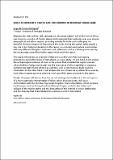Por favor, use este identificador para citar o enlazar a este item:
http://hdl.handle.net/10261/259639COMPARTIR / EXPORTAR:
 SHARE
BASE SHARE
BASE
|
|
| Visualizar otros formatos: MARC | Dublin Core | RDF | ORE | MODS | METS | DIDL | DATACITE | |

| Título: | Build on diversity: states and communities in medieval Somaliland |
Autor: | Torres Rodriguez, Jorge de CSIC ORCID | Palabras clave: | Horn of Africa Islamic archaeology Muslim states Medieval Archaeology |
Fecha de publicación: | sep-2021 | Citación: | 27th Annual Meeting of the European Association of Archaeologists (2021) | Resumen: | Between the 11th and the 16th centuries AD, the south-eastern half of the Horn of Africa was home to a number of Muslim states which extended their authority over very diverse geographical and ethnic regions, providing stability for trade and challenging the powerful Christian kingdom of Abyssinia to the north. During this period, Islam played a key role in two historical dynamics in the region: as a shared space where communities with very different lifestyles could meet and collaborate; and as a binding force used by the increasingly controlling Muslim states which ruled the region. This paper will present an overview of these two parallel and often overlapping phenomena, taking the region of Somaliland as a case study. On one hand, it will analyse the archaeological evidence of Islam in the groups that inhabited the region (nomads, urban dwellers, foreign merchants) and the importance of this materiality in creating a symbolic but stable frame where key activities such as international trade could be conducted. On the other hand, it will analyse the role of Islam as a political force used by local rulers to generate more cohesive –and controlled- state structures in the region. Finally, the paper will discuss how this second strategy eventually led to the emergence of a more aggressive interpretation of Islam, which developed into a full scale confrontation with the Christian Abyssinian kingdom. That confrontation, which involved world powers such as Portugal and the Ottoman Empire, ended in the defeat and collapse of the Muslim states and the dismantling of the network of urban settlements and the diversity that characterized the medieval period in Somaliland. | Descripción: | Trabajo presentado en 27th Annual Meeting of the European Association of Archaeologists (EAA), celebrada en Kiel del 6 al 11 de septiembre de 2021. | URI: | http://hdl.handle.net/10261/259639 |
| Aparece en las colecciones: | (INCIPIT) Comunicaciones congresos |
Ficheros en este ítem:
| Fichero | Descripción | Tamaño | Formato | |
|---|---|---|---|---|
| Build_on_diversity.pdf | 1,24 MB | Adobe PDF |  Visualizar/Abrir |
CORE Recommender
NOTA: Los ítems de Digital.CSIC están protegidos por copyright, con todos los derechos reservados, a menos que se indique lo contrario.
